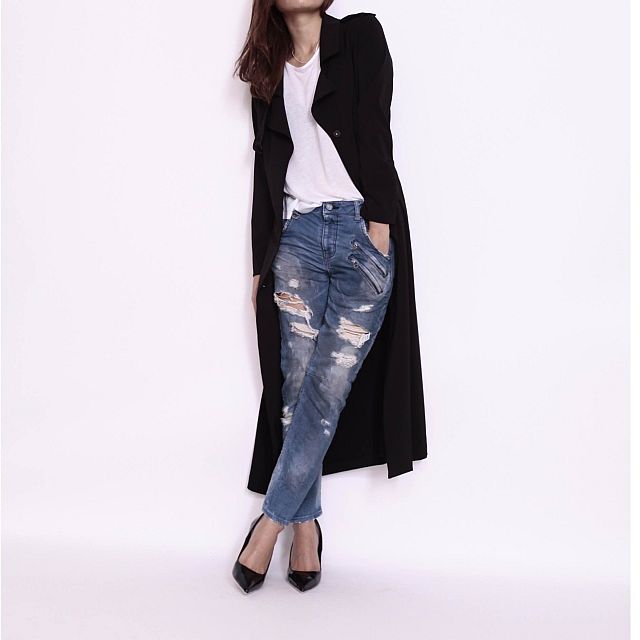Abright note has emerged from SHIBUYA 109, where business operators continue to struggle. The Regalect brand produced by Astonish co., Ltd., which set up its first store in autumn 2014, has got off to a good start. The brand, which centres around Japanese-made jeans costing about 20,000 yen, has recorded a high average sale per customer of 15,000 yen. The concept of going against the trend has generated success for the brand. The idea was conjured up by company directors Taiichi Okada and Daisuke Tajiri, both of whom had long been actively involved in the younger women’s market.
In a retail space lined with product-filled racks where loud music plays, Regalect’s presence is certainly distinct. The entrance is enclosed by glass, and displays that make good use of the space make teenagers think twice about entering. There is also no point-of-purchase advertising (POP) used to promote sales. The store has placed all its bets on the appeal of the product alone.
All of the denim products are produced in Japan and manufactured through direct communication with artisans in Kojima, Okayama Prefecture. The offer includes jeans that have been processed – torn, washed and painted jeans – as well as jersey trousers that have the look of denim, and shorts that create a sense of volume through the twisting and reversing of the fabric. Other popular items include cashmere and silk-blend T-shirts, and voluminous hoodies.
The brand’s customer base consists of those in their mid-20s and 30s who enjoy fashion, and who have already tried out various types of jeans. Although many people typically revisit a store in search of new trends, sales staff from other stores are surprised to find that many of Regalect’s customers come back to the store in order to buy several more of the same product.
Since opening at the end of August, the store has achieved sales of 18 million yen in September, 13.5 million yen in October, and 12 million yen in November. This is more than double its sales target, and it is now unable to keep pace with its product launches.
In the words of director Okada, the brand was launched with the vision of “creating apparel that pierces the heart”. It was received far better than its creators could have expected, erasing any doubts they may have had and filling them with the firm belief that it is possible to communicate the quality of a product to customers.
The reason the creators placed the focus on denim is due to bad experiences of having been heavily dependent on, and influenced by, trends. They reasoned that any brand that was focused on tastes would be heavily influenced by trends, but if the focus of its products were on the material, they would be able to generate stable sales.
In order to prevent the brand from taking on any particular defining character, the faces of models are trimmed off before photographs are posted onto Instagram, a photo-sharing app, for publicity and dissemination purposes. Individual sales staff are allowed to style the brand apparel they wear however they like. The aim is to not restrict its customer base in any way, but rather to capture an audience over a shallow but wide scope.
Information about the brand has been widely spread among fashion models via social media, and there are many customers who come to the store in search of specific items. However, there has also been a rise in the number of passers-by who enter the store after touching the products placed at the entrance.
General manager Kenji Nakazato of SHIBUYA109, where Regalect is housed, is positive about the brand, commenting, “While there are many companies that have to give up on their brands, Regalect has a sense of mission in its earnest desire to sell truly great products.” The company does not over-stretch itself to expand the business, and instead aims to first get the store on track, strengthen its wholesale capabilities, and expand its fan-base. It is also eyeing the possibility of selling its products in Europe and America.


